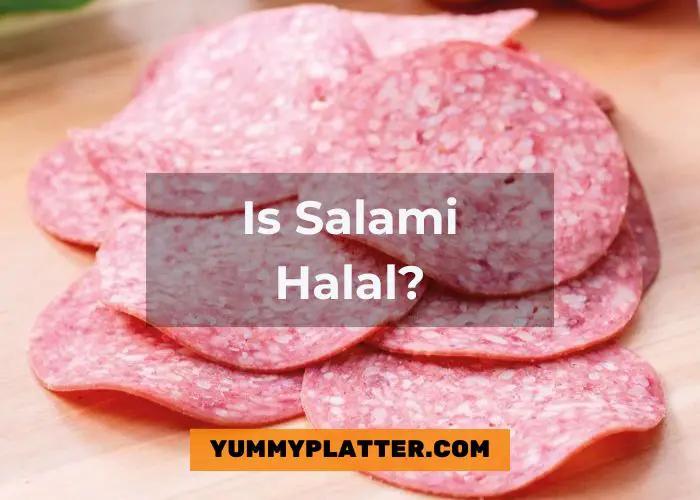Many of us love to explore different foods from around the world. Salami is one of those delicious treats that has fans everywhere. But, if you follow halal dietary laws, you might wonder, “Is salami halal?”
Halal food is very important in Islam. It follows specific rules that Muslims must adhere to. When it comes to meat, not all types are halal. So, it makes us curious about salami.
In this article, we’re diving into the world of salami. We’ll find out if salami is halal and how to make sure the salami you eat meets halal standards. Whether you’re a long-time fan of salami or just getting to know it, this post is for you. Let’s get started on this tasty journey together!
Let’s Talk About Halal
What does “halal” mean? In simple terms, halal is what’s allowed in Islam. It’s not just about food. It covers many parts of life. But today, we’re focusing on halal food, especially halal meat.
For meat to be halal, it must meet certain rules. First, the animal must be healthy at the time of slaughter. The person doing the slaughtering must be Muslim. They must say a prayer at the time. Also, they should cut the animal’s throat in a specific way. This method is quick and aims to be as painless as possible.
But halal is not only about the slaughter. The animal must also be treated well during its life. And there’s more to halal food than just meat. All ingredients in a product need to be halal. This means no alcohol or certain animal products.
Sometimes, people get mixed up about what’s halal. They might think if something is vegetarian, it’s automatically halal. But that’s not always true. Halal certification helps clear this up. When you see a halal certificate on food, you know it meets all these rules.
Understanding halal helps us respect each other’s dietary choices. It also makes sure everyone can enjoy their meals without worry.
Salami Making: A Step-by-Step Journey
Have you ever bitten into a slice of salami and wondered how it got its flavors? Let’s dive into the journey of making salami. It’s quite fascinating!
It all starts with selecting meat. While pork is often used, for salami to be halal, they use beef, chicken, or even lamb. The first step involves mixing this meat with a bunch of spices and salt. Each salami recipe has its own secret spice mix that makes it unique.
After spicing things up, they add curing salt to the mix. This isn’t just any salt; it helps keep the salami safe to eat and contributes to its distinct taste.
Next comes the stuffing. They pack the seasoned meat into casings, essentially shaping the salami. These casings are sometimes natural, made from animal intestines, but for halal salami, they ensure the casings meet halal standards too.
Now, the salami needs to dry. This isn’t a quick step. The drying is what gives salami its chewy texture. They hang the salami in a controlled environment where it loses moisture and becomes firmer.
But there’s a twist – fermentation. This might seem a bit technical, but it’s essentially a natural process where good bacteria start to work on the salami. This not only adds a tangy flavor but also acts as a natural preservative.
This entire process, from seasoning to drying, is crafted with care. It ensures that each bite of salami is a blend of savory flavors with just the right amount of spice and tang.
When people ask if salami is halal, they’re really asking about each step in this process. To be halal, every ingredient, including the meat and casings, must comply with halal guidelines.
Exploring Halal Certification for Salami
Getting salami certified as halal isn’t always a walk in the park. There are a few hurdles along the way. Let’s take a look at what makes it tricky.
First off, traditional salami often includes pork, which is a no-go in halal food. So, they switch to beef, chicken, or lamb for halal versions. But, it’s not just about swapping meat. Every single ingredient needs a check for halal compliance.
Cross-contamination is another big challenge. In factories where they make both halal and non-halal foods, keeping everything separate is crucial. Even a tiny mix-up can make the salami non-halal.
Then, there’s the issue of alcohol. Some salami recipes use wine or other alcohols in the curing process. For salami to be halal, they need to skip the alcohol entirely or find a halal-approved alternative.
Ingredients like enzymes and cultures that help in fermentation also need a halal stamp of approval. It’s not always easy to find these ingredients in halal-certified forms, especially in places like the USA and UK, where halal options might be limited.
Despite these challenges, many producers are stepping up. They’re finding ways to make sure every part of the salami-making process meets halal standards. It’s all about ensuring that Muslim consumers in the USA, UK, and everywhere else can enjoy salami without compromising their dietary laws.
Finding Halal Salami Made Easy
Hunting for halal salami? It’s easier than you think, whether you’re in the USA, the UK, or elsewhere. Here’s how to make sure you’re picking the right one.
Start by checking labels. Look for the halal certification mark. This little symbol is your best friend. It means the salami has passed all the checks and is safe for your halal diet.
Not all labels are clear, though. When in doubt, dive into the ingredient list. You’re looking for any non-halal items or alcohol. If the list is clean, you’re good to go.
Keep an eye out for trusted halal certification bodies. There are a few well-known ones in both the USA and the UK. Their approval is like a green light for halal consumers.
Where to shop? Your local halal butcher is a goldmine. They often stock halal salami or can point you in the right direction. Supermarkets and specialty stores are getting better at stocking halal options, too.
Don’t forget online shopping. Many halal producers sell directly to customers. Plus, you can often find reviews from other halal shoppers. This can be a great way to discover new halal salami brands.
Why Supporting Halal Producers Matters
Ever thought about where your food comes from? When you buy halal, especially halal salami, you’re doing more than just eating. You’re supporting a whole community. Here’s why that’s a big deal.
Halal producers work hard to meet strict guidelines. By choosing their products, you help them keep going. It’s like giving them a thumbs-up for their effort. This support helps more halal options hit the shelves, making it easier for everyone to find what they need.
Then there’s the bigger picture. Buying halal supports Muslim businesses. It’s a way to keep money within the community, helping it grow stronger. Plus, it encourages more businesses to consider halal certification, expanding the choices available to you.
Supporting halal producers also promotes ethical eating. Many halal standards align with ethical farming and animal welfare. By choosing halal, you’re voting for a kinder, more responsible food industry.
In places like the USA and UK, where halal might not be the majority choice, every purchase counts. It sends a message to the food industry: there’s a demand for halal products. This can lead to more investment in halal production and, ultimately, more options for consumers.
So, next time you pick up a packet of halal salami, remember, it’s more than just a tasty snack. It’s a choice that supports ethical practices, community growth, and the availability of halal food.
FAQs
Can salami ever be considered halal?
Yes, salami can be halal if it’s made according to Islamic dietary laws. This includes using halal-certified meat (such as beef, chicken, or lamb instead of pork) and ensuring all other ingredients, including the casing and any additives, are halal. It must also be prepared and processed in a facility that adheres to halal standards to avoid cross-contamination.
How do I know if a salami is halal?
Look for a halal certification symbol on the packaging. This symbol indicates that a recognized halal certification body has inspected and approved the product. You can also check the ingredient list for any non-halal items or contact the manufacturer for their halal certification information.
Are there any specific brands that sell halal salami in the USA and UK?
Yes, there are several brands that sell halal salami in both the USA and the UK. The availability of brands may vary by region, so it’s best to check local halal butchers, grocery stores, or online retailers that specialize in halal products. Always ensure that the product has a halal certification mark.
Wrapping It Up: Halal Salami Insights
So, we’ve dug deep into the world of salami and its halal status. Finding halal salami is definitely possible. It’s all about knowing what to look for and where to find it. Always check for that halal certification mark. It’s your shortcut to enjoying salami without worry. Remember, every time you choose halal salami, you’re supporting businesses that care about your dietary needs. It’s a small choice that makes a big difference. And with more demand, we’ll see even more halal options in stores, making it easier for everyone to stick to their dietary laws.










Leave a reply